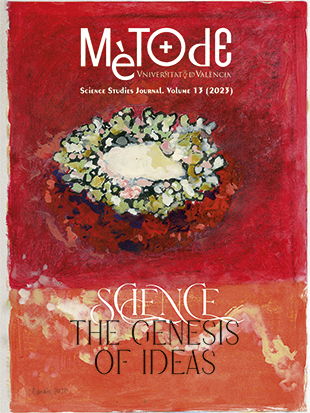Boosting vaccination: Accelerating vaccine uptake through communication science
DOI:
https://doi.org/10.7203/metode.13.23759Keywords:
behavior change, COVID-19 vaccine, communication science, persuasion, public health Abstract
Abstract
Effective public health messages about vaccination can bolster human vaccine uptake to prevent the spread of infectious diseases. Despite this potentiality, the One Health framework that values an interdependent approach to health has not fully considered the role of communication science in promoting public health. In this article, we offer evidence-based recommendations for health practitioners and researchers creating vaccine promotion messages. An interdisciplinary field, communication science suggests that vaccine messages can change beliefs, attitudes, and behaviors through a systematic understanding of one’s audience and targeted and tailored health messages that appeal to beliefs about the outcomes of a behavior and beliefs about an individual’s behavioral efficacy. Implications for and challenges to vaccine communication are discussed.
 Downloads
Downloads
 References
References
Ajzen, I. (1991). The theory of planned behavior. Organizational Behavior and Human Decision Processes, 50(2), 179–211. https://doi.org/10.1016/0749-5978(91)90020-T
Bandura, A. (1977). Self-efficacy: Toward a unifying theory of behavioral change. Psychological Review, 84(2), 191–215. https://doi.org/10.1037/0033-295X.84.2.191
Bandura, A. (1998). Health promotion from the perspective of social cognitive theory. Psychology and Health, 13(4), 623–649. https://doi.org/10.1080/08870449808407422
Bandura, A. (2001). Social cognitive theory: An agentic perspective. Annual Review of Psychology, 52(1), 1–26. https://doi.org/10.1146/annurev.psych.52.1.1
Fishbein, M. (1979). A theory of reasoned action: Some applications and implications. Nebraska Symposium on Motivation, 27, 65–116.
Fishbein, M., & Cappella, J. N. (2006). The role of theory in developing effective health communications. Journal of Communication, 56(s1), S1–S17. https://doi.org/10.1111/j.1460-2466.2006.00280.x
Higgins, E., T. (2000). Making a good decision: Value from fit. American Psychologist, 55(11), 1217–1230. https://doi.apa.org/doi/10.1037/0003-066X.55.11.1217
Hornik, R. (2002). Public health communication: Evidence for behavior change. Routledge.
Hornsey, M. J., Oppes, T., & Svensson, A. (2002). «It’s OK if we say it, but you can’t»: Responses to intergroup and intragroup criticism. European Journal of Social Psychology, 32(3), 293–307. https://doi.org/10.1002/ejsp.90
Jackson, D. N., Peterson, E., Blake, K. D., & Coa, K. (2019). American’s trust in health information sources: Trends and sociodemographic factors. American Journal of Health Promotion, 33(8), 1187–1193. https://doi.org/10.1177/0890117119861280
Janz, N. K., & Becker, M. H. (1984). The health belief model: A decade later. Health Education Quarterly, 11(1), 1–47. https://doi.org/10.1177/109019818401100101
Lapinski, M. K., Funk, J. A., & Moccia, L. T. (2015). Recommendations for the role of social science research in One Health. Social Science & Medicine, 129, 51–60. https://doi.org/10.1016/j.socscimed.2014.09.048
Lewandowsky, S., & Van Der Linden, S. (2021). Countering misinformation and fake news through inoculation and prebunking. European Review of Social Psychology, 32(2), 1–38. https://doi.org/10.1080/10463283.2021.1876983
McGuire, W. J. (1961). The effectiveness of supportive and refutational defenses in immunizing and restoring beliefs against persuasion. Sociometry, 24(2), 184–197. https://doi.org/10.2307/2786067
McGuire, W. J. (1989). Theoretical foundations of campaigns. In R. E. Rice & C. K. Atkin (Eds.), Public communication campaigns (Vol. 2, pp. 43–65). Sage.
Nan, X., Iles, I. A., Yang, B., & Ma, Z. (2022). Public health messaging during the Covid-19 pandemic and beyond: Lessons from communication science. Health Communication, 37(1), 1–19. https://doi.org/10.1080/10410236.2021.1994910
O’Keefe, D. J. (2002). Persuasion: Theory and research. Sage.
Paul, E., Steptoe, A., & Fancourt, D. (2020). Attitudes towards vaccines and intention to vaccinate against Covid-19: Implications for public health communications. The Lancet, 1, 100012. https://doi.org/10.1016/j.lanepe.2020.100012
Sheeran, P., Maki, A., Montanaro, E., Avishai-Yitshak, A., Bryan, A., Klein, W. M., Miles, E., & Rothman, A. J. (2016). The impact of changing attitudes, norms, and self-efficacy on health-related intentions and behavior: A meta-analysis. Health Psychology, 35(11), 1178–1188. https://psycnet.apa.org/doi/10.1037/hea0000387
Additional Files
Published
How to Cite
-
Abstract1736
-
(Español)2
-
HTML1490
-
PDF601
Issue
Section
License
![]()
All the documents in the OJS platform are open access and property of their respective authors.
Authors publishing in the journal agree to the following terms:
- Authors keep the rights and guarantee Metode Science Studies Journal the right to be the first publication of the document, licensed under a Creative Commons Attribution-NonCommercial-NoDerivatives 4.0 International License that allows others to share the work with an acknowledgement of authorship and publication in the journal.
- Authors are allowed and encouraged to spread their work through electronic means using personal or institutional websites (institutional open archives, personal websites or professional and academic networks profiles) once the text has been published.





